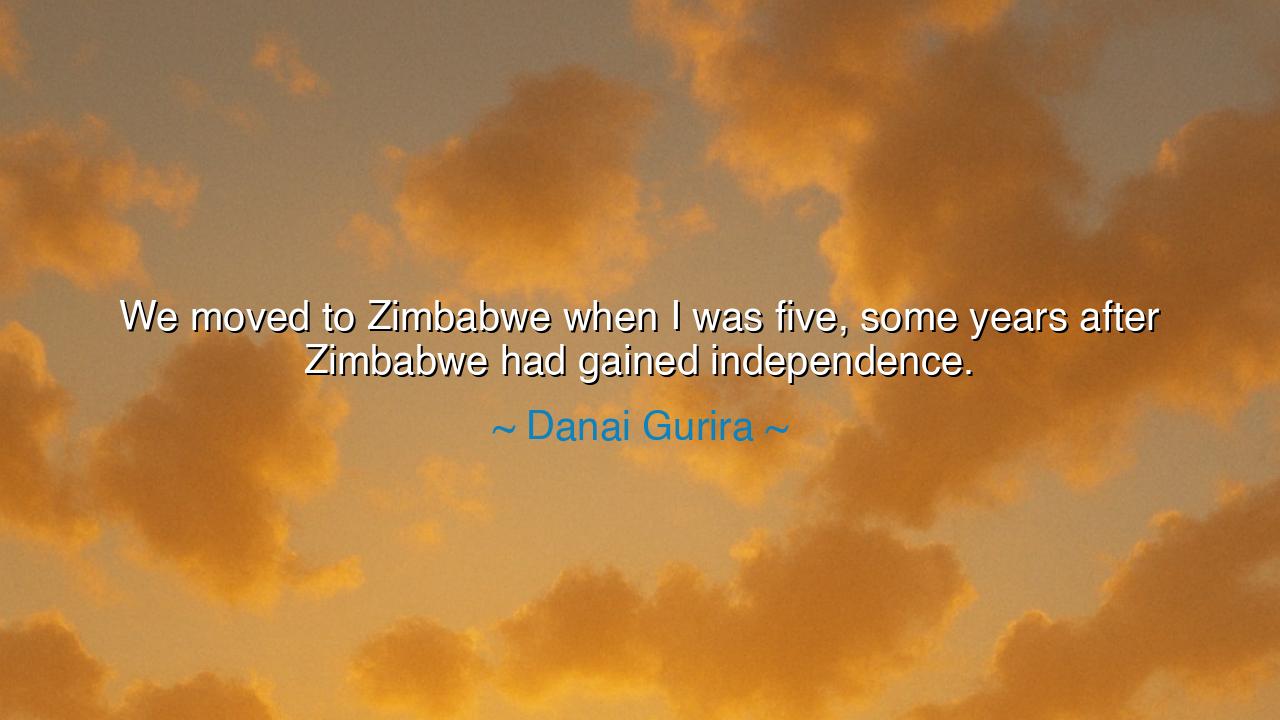
We moved to Zimbabwe when I was five, some years after Zimbabwe
We moved to Zimbabwe when I was five, some years after Zimbabwe had gained independence.






The acclaimed actress and playwright Danai Gurira, known for her fierce artistry and deep cultural pride, once said: “We moved to Zimbabwe when I was five, some years after Zimbabwe had gained independence.” These words, simple and personal, carry within them the quiet thunder of history. They are not merely a statement of memory, but a reflection of identity, rebirth, and the inheritance of freedom. For to be born in a time shaped by independence is to walk upon ground newly consecrated by struggle — to live in the echo of those who fought, bled, and dreamed of sovereignty. Gurira’s words remind us that every child born after liberation still carries the weight and the promise of that freedom, whether they know it or not.
At the heart of her reflection lies the sacred connection between place, memory, and awakening. Zimbabwe — once called Rhodesia under colonial rule — had endured nearly a century of foreign domination. When Gurira’s family moved there, the land was still young with freedom, its people still learning the rhythms of self-rule. The air carried both the hope of renewal and the scars of war. For independence is never the end of struggle; it is the beginning of self-discovery. To live in such a time is to feel history stirring in one’s bones — to witness a nation reclaiming its soul, and to be shaped by the collective breath of a people who have remembered their power.
The origin of this moment reaches deep into the story of the African continent, a story written in courage and fire. For decades, Zimbabwe — under colonial rule — was divided by inequality, where the native population was denied land, voice, and freedom. Yet from those fields of oppression rose the liberation movements, led by visionaries such as Robert Mugabe and Joshua Nkomo, who ignited the long war for freedom. In 1980, the dream was fulfilled: Zimbabwe gained independence, and the Union Jack was lowered from the capital of Salisbury — now Harare. To the world, this marked the end of empire; but to the people, it marked the rebirth of destiny. It was into this reborn world that the young Gurira arrived — into a land healing, building, and believing once more.
Her experience mirrors the ancient truth that freedom must be renewed by every generation. A child who grows up in the shadow of liberation inherits more than just peace; they inherit the duty to preserve and expand it. In this way, Gurira’s life becomes a bridge — between the generation that fought for freedom and the generation that must define its meaning. Her later work as a storyteller, both in film and on stage, reflects this inheritance. Through her art, she carries forward the voice of her people — giving form to the spirit of Africa, which is both ancient and ever-new. Her creative power is itself a continuation of the independence her homeland achieved. For art, too, is a form of sovereignty — the sovereignty of the mind and the spirit.
Consider how her journey mirrors that of postcolonial nations around the world. Just as Zimbabwe sought to reclaim its identity after years of foreign rule, so too have individuals and societies across history fought to rediscover themselves after long subjugation. The people of India, after centuries under the British crown, found themselves asking what freedom truly meant once the chains were broken. So it is with all who awaken after oppression: independence is not a single moment, but a lifelong act of creation. It is not only the liberation of land, but the liberation of imagination — the freedom to dream, to rebuild, and to define one’s own story.
Through her words, Gurira reminds us that independence is not inherited—it is lived. Her family’s return to Zimbabwe was not merely a homecoming, but a pilgrimage to a land that was rediscovering its heartbeat. To live there as a child was to witness the beauty of a nation learning to walk again, to stumble, and to rise stronger. It teaches that freedom is fragile if it is not tended, that it must be defended not just by armies but by education, culture, and truth. Gurira’s life — split between continents, rooted in Africa but blossoming on global stages — embodies this lesson: that true independence is both collective and personal, both a nation’s triumph and an individual’s awakening.
So let us take her words as both remembrance and call to action. Freedom, once gained, must not be forgotten in comfort. Every generation must labor to understand its meaning, to heal its wounds, and to keep its flame alive. Whether in a country emerging from colonial rule or in a heart emerging from fear, the same law holds true: independence without wisdom fades into dependency once more. Like Zimbabwe, every soul must learn to govern itself, to rise beyond its past, and to create new life from the soil of struggle.
Thus, Danai Gurira’s memory becomes our lesson — that we are all children of some form of liberation. Whether born into nations newly free or into families breaking cycles of hardship, each of us inherits the responsibility to honor our independence by deepening it. For freedom is not the absence of chains, but the presence of purpose. And those who live with gratitude, courage, and creativity — as Gurira has done — will ensure that the victory of one generation becomes the foundation of another’s awakening.






AAdministratorAdministrator
Welcome, honored guests. Please leave a comment, we will respond soon